倒装句和强调句
英语中的强调句和倒装句

英语中的强调句和倒装句强调句和倒装句是英语语法中的两种重要句型,它们在句子中起到强调和突出某一成分的作用。
在英语写作中,合理运用强调句和倒装句可以使文章更加生动有力,增加语言的表达效果。
本文将从强调句和倒装句的定义、形式、用法以及例句等方面进行探讨,以帮助读者更好地理解和运用这两种句型。
一、强调句的定义和形式强调句是为了突出或强调某一成分而进行的句子结构调整。
在英语中,强调句通常通过将强调的成分提前或使用特殊的强调结构来实现。
强调句的形式有多种,包括强调代词、强调副词、强调形容词和强调句子等。
1. 强调代词强调代词是一种特殊的代词,用于强调句子中的某一成分。
常见的强调代词有:itself, himself, herself, themselves, yourself, myself, ourselves, yourselves等。
例如:- It was John himself who broke the vase.(是约翰自己打破了花瓶。
)- She herself cooked the delicious meal.(她亲自做了这顿美味的饭菜。
)2. 强调副词强调副词用于强调句子中的某一副词或短语,常见的强调副词有:only, just, even, never, ever等。
例如:- He only ate one slice of cake.(他只吃了一块蛋糕。
)- I have never been to Paris before.(我以前从未去过巴黎。
)3. 强调形容词强调形容词用于强调句子中的某一名词或代词,常见的强调形容词有:real, true, only等。
例如:- This is the only book I have.(这是我唯一的一本书。
)- He is a true friend.(他是一个真正的朋友。
)4. 强调句子强调句子是通过强调结构来强调整个句子的内容。
常见的强调结构有:Itis/was...that, What...is/was等。
高中英语知识点归纳倒装句和强调句的区别

高中英语知识点归纳倒装句和强调句的区别高中英语知识点归纳:倒装句和强调句的区别在高中英语中,倒装句和强调句都是非常重要的语法结构,但它们之间存在一定的区别。
本文将对倒装句和强调句的概念、结构和用法进行归纳和总结,旨在帮助学生更好地理解和运用这两种句型。
一、倒装句1. 概念:倒装句是指将正常语序中的主语和谓语动词倒置的一种句型。
在英语中,主要有完全倒装和部分倒装两种形式。
2. 完全倒装:将助动词或情态动词置于主语之前,谓语动词置于主语之后。
例子:a) Never have I seen such a beautiful sunset before.(我从未见过如此美丽的日落。
)b) Only in this way can we improve our English skills.(只有这样,我们才能提高英语水平。
)3. 部分倒装:将助动词或情态动词置于主语之前,且在其后紧随一个状语或副词。
例子:a) Hardly had she started her speech when the power went out.(她刚开始演讲,电源就断了。
)b) Not only did he pass the test, but he also got the highest score.(他不仅通过了考试,而且还得到了最高分。
)二、强调句1. 概念:强调句是为了强调句子中的某个成分,在句子中将被强调的成分提前,并使用强调句型进行表达。
2. 结构:在强调句中,一般使用"It is/was + 被强调的部分 +that/who"的结构。
例子:a) It is John who broke the window.(打破窗户的是约翰。
)b) It was yesterday that we had the meeting.(开会是在昨天。
)3. 注意事项:在强调句中,如果被强调的是疑问词,如who, what, when等,则使用"It is/was + 被强调的疑问词 + that/who"的结构。
初中中常见的倒装句与强调句用法

初中中常见的倒装句与强调句用法倒装句是英语语法中常用的一种句型结构,它在初中英语学习中占有重要的地位。
同时,强调句也是初中英语的基本知识点之一。
本文将详细介绍初中中常见的倒装句和强调句的用法。
一、倒装句的基本概念与结构倒装句指的是主语和谓语在句子中的位置颠倒。
一般来说,英语中的倒装句主要有两种形式:完全倒装和部分倒装。
1. 完全倒装完全倒装句的结构是:助动词/情态动词 + 主语 + 谓语动词。
当句子以频副词或其它副词开头时,常常使用完全倒装。
例如:1) Never had I seen such a beautiful sunset before.我从未见过如此美丽的日落。
2) Rarely do we have the opportunity to travel abroad.我们很少有机会出国旅行。
2. 部分倒装部分倒装句的结构是:动词 + 主语。
在一些特殊情况下,我们需要使用部分倒装来加强语气或强调某个部分。
例如:1) Not only does he play the piano, but he also sings beautifully.他不仅会弹钢琴,而且唱得很好。
2) Little did he know that she had been waiting for him all night.他并不知道她已经等了他一整晚。
二、常见的倒装句用法倒装句在初中英语中非常常见,特别是在以下几个情况下:1. 表示部分否定的情况当句子中有“never”,“rarely”,“seldom”等意味“从不”的副词时,经常使用倒装句。
例如:1) Never have I seen such a talented young man.我从未见过如此有才华的年轻人。
2) Rarely does he complain about anything.他很少抱怨什么。
2. 表示地点状语的情况当句子中的状语是表示地点的副词或介词短语时,也经常使用部分倒装。
强调句和倒装句
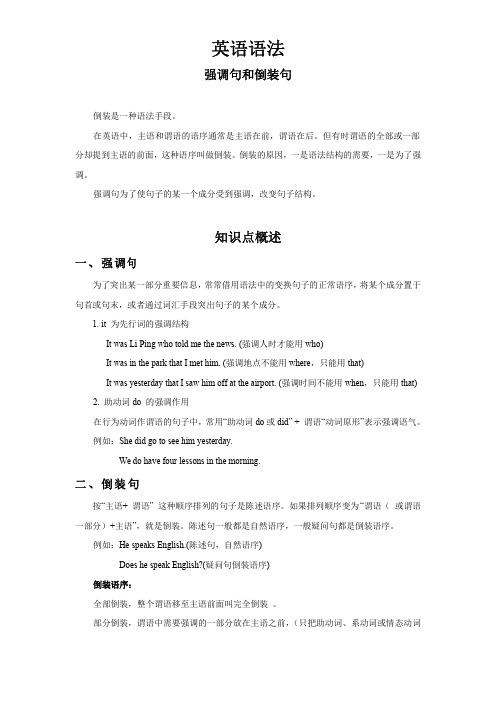
14. 在虚拟语气条件句中从句谓语动词有 were, had, should 等词,可将 if 省略,把 were, had, should 移到主语之前,采取部分倒装。
If I were you, I would take the job. = Were I you, I would take the job.
We seldom get up at four in the morning.
= Seldom do we get up at four in the morning.
Not a single word from him could the enemy drag.
Rarely have I heard of such a hough 引导的让步从句必须将表语或状语提前 (形容词, 副词, 分词, 实义动词提
前)。
Poor as he was, his will was strong.
Late as it was, we continued to work.
注意: 1) 句首名词不能带任何冠词。
A Child as he is, he can do it. (WRONG) Child as he is, he can do it. (CORRECT)
语法辨析强调句与倒装句的区别与应用

语法辨析强调句与倒装句的区别与应用强调句与倒装句是英语语法中常见的两种结构,它们在句子结构和语义表达上具有一定的相似之处,但同时又有着明显的区别和不同的应用场景。
本文将对强调句和倒装句进行详细的辨析,并分析它们在实际运用中的差异和适用范围。
一、强调句的特点和应用强调句是为了突出某个成分、某种情况或某个观点而使用的特殊句式,通过在句子中使用"it is"或"there is/are"等结构进行增强语气,进而产生强调的效果。
在强调句中,被强调的成分通常放在句首或句末位置。
1. 强调句的形式强调句的基本形式为:"It is/was" + 被强调部分 + "that/who/which" + 其余部分。
例如:- It is Mary who won the first prize in the competition.- There is an urgent matter that needs your immediate attention.2. 强调句的功能强调句的主要功能是为了使某个成分显得更为突出和重要,从而引起读者或听者的注意。
它可以用于强调人物、事物、地点、时间、原因等各种具体的成分。
例如:- It was at the top of the mountain that they finally found the lost treasure.- There is only one person who can solve this problem.二、倒装句的特点和应用倒装句是指在英语句子中,将谓语动词或助动词放在主语之前的结构。
它常用于条件句、状语从句、助动词后面省略的情况以及某些特殊句型中,以使句子结构更加紧凑或突出句子中的某些成分。
1. 完全倒装句在一般陈述句中,要出现倒装结构,主要有以下几种情况:- 在表示地点和方向的状语从句中,介词短语位于句首时,需要倒装。
倒装,强调,反义疑问句,感叹句
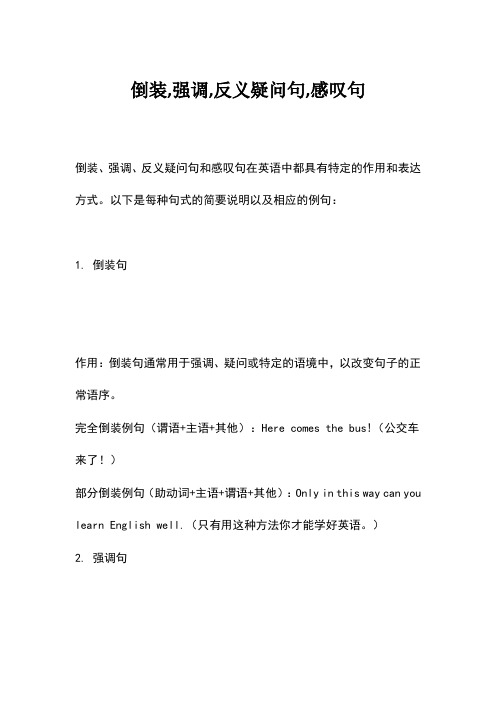
倒装,强调,反义疑问句,感叹句
倒装、强调、反义疑问句和感叹句在英语中都具有特定的作用和表达方式。
以下是每种句式的简要说明以及相应的例句:
1. 倒装句
作用:倒装句通常用于强调、疑问或特定的语境中,以改变句子的正常语序。
完全倒装例句(谓语+主语+其他):Here comes the bus!(公交车来了!)
部分倒装例句(助动词+主语+谓语+其他):Only in this way can you learn English well.(只有用这种方法你才能学好英语。
)
2. 强调句
作用:强调句用于突出句子中的特定信息,通常是使用“It was … that”结构。
例句:It was John who broke the window.(是约翰打破了窗户。
)3. 反义疑问句
作用:反义疑问句用于确认或询问信息,通常由陈述句和一个附加的简短疑问句组成。
例句:You are coming to the party, aren't you?(你要来参加聚会,不是吗?)
4. 感叹句
作用:感叹句用于表达强烈的情感,如惊讶、喜悦、愤怒等。
通常由what或how引导。
What引导的例句:What a beautiful day it is!(天气多好啊!)How引导的例句:How fast he runs!(他跑得多快啊!)。
倒装句与强调句
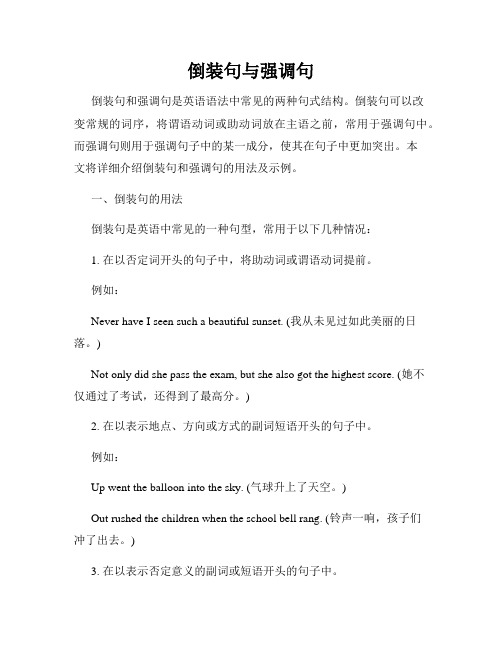
倒装句与强调句倒装句和强调句是英语语法中常见的两种句式结构。
倒装句可以改变常规的词序,将谓语动词或助动词放在主语之前,常用于强调句中。
而强调句则用于强调句子中的某一成分,使其在句子中更加突出。
本文将详细介绍倒装句和强调句的用法及示例。
一、倒装句的用法倒装句是英语中常见的一种句型,常用于以下几种情况:1. 在以否定词开头的句子中,将助动词或谓语动词提前。
例如:Never have I seen such a beautiful sunset. (我从未见过如此美丽的日落。
)Not only did she pass the exam, but she also got the highest score. (她不仅通过了考试,还得到了最高分。
)2. 在以表示地点、方向或方式的副词短语开头的句子中。
例如:Up went the balloon into the sky. (气球升上了天空。
)Out rushed the children when the school bell rang. (铃声一响,孩子们冲了出去。
)3. 在以表示否定意义的副词或短语开头的句子中。
例如:Never before had I seen such a beautiful painting. (我从未见过如此美丽的画作。
)Little did she know about the surprise birthday party. (她对生日惊喜派对一无所知。
)4. 在以表语或状语开头的句子中,为了强调表语或状语。
例如:Cold was the wind that blew through the valley. (吹过山谷的风很冷。
) Hard did she work to achieve her dreams. (她努力工作以实现她的梦想。
)二、强调句的用法强调句用于强调句子中的某一成分,使其在句子中更加突出。
通常使用it is/was...that来引导强调句。
倒装句,强调句

倒装句1.完全倒装:谓语部分全部置于主语之前的句子,便是完全倒装句。
1)表示方位的副词或介词短语,如here, there, now, then, up, down, in, away, off, out, in the room等,置于句首时Out rushed the children.Away flew the plane.2) such置于句首时,多被认为是表语,所以,such后的be动词应与其后的“真正的主语”保持一致。
Such was Albert Einstein, a simple man and the 20th century’s greatest scientist.Such are the facts; no one can deny them.2.部分倒装:只把谓语的一部分(多为助动词或情态动词)置于主语之前的句子,称为部分倒装句。
1)Only修饰副词、介词短语或状语从句,且放在句首时。
Only in this way can we learn English well.Only when he returned did we found out the truth.2) ……;so+助动词+主语“……也是如此”They love having lots of friends; so do those with disabilities.如果句意不是“……也是如此”,而仅是对前述内容的肯定或附和,那么,句子则不可使用倒装式,试比较:He came last night, and so did I.A. It is hot.B. So it is.3)……;neither(或nor)+助动词+主语“……也不这样”Lily can’t ride; neither can lucy.4) so+ adj / adv….that…“如此……以至于……“So clearly does he speak English that he can always make himself understood.5) not only…., but also…. “不仅……而且……”Not only will help be given to people to find jobs, but also medical treatment will be provided for people who need it.6) not until…“直到……才…”Not until he returned did we have supper.注意:如果not until引导的是句子,until从句的主谓不可倒装,而是主句需要倒装。
初中英语中的倒装句与强调句
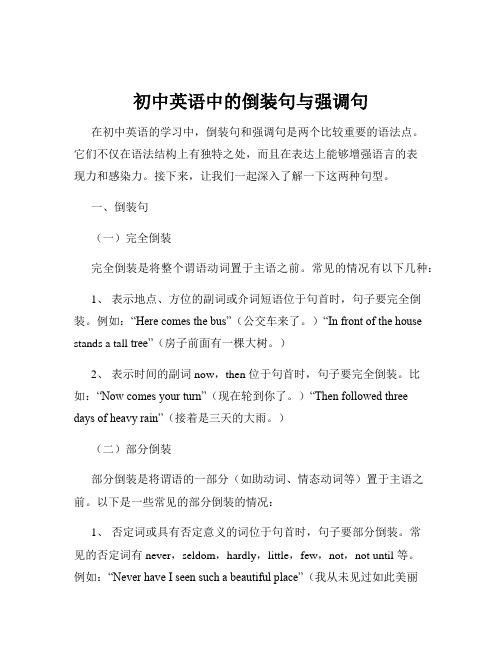
初中英语中的倒装句与强调句在初中英语的学习中,倒装句和强调句是两个比较重要的语法点。
它们不仅在语法结构上有独特之处,而且在表达上能够增强语言的表现力和感染力。
接下来,让我们一起深入了解一下这两种句型。
一、倒装句(一)完全倒装完全倒装是将整个谓语动词置于主语之前。
常见的情况有以下几种:1、表示地点、方位的副词或介词短语位于句首时,句子要完全倒装。
例如:“Here comes the bus”(公交车来了。
)“In front of the house stands a tall tree”(房子前面有一棵大树。
)2、表示时间的副词 now,then 位于句首时,句子要完全倒装。
比如:“Now comes your turn”(现在轮到你了。
)“Then followed three days of heavy rain”(接着是三天的大雨。
)(二)部分倒装部分倒装是将谓语的一部分(如助动词、情态动词等)置于主语之前。
以下是一些常见的部分倒装的情况:1、否定词或具有否定意义的词位于句首时,句子要部分倒装。
常见的否定词有 never,seldom,hardly,little,few,not,not until 等。
例如:“Never have I seen such a beautiful place”(我从未见过如此美丽的地方。
)“Not until he came back did I know the truth”(直到他回来我才知道真相。
)2、“only +状语”位于句首时,句子要部分倒装。
“Only in this way can you learn English well”(只有通过这种方式你才能学好英语。
)3、 so / neither / nor 位于句首,表示前面所说的情况也适用于另一人或物时,句子要部分倒装。
例如:“He likes swimming So do I”(他喜欢游泳,我也喜欢。
语法中倒装句和强调句的运用技巧知识点总结
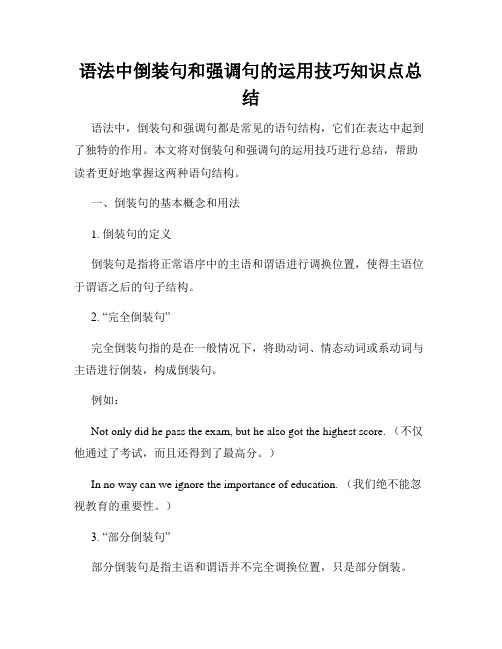
语法中倒装句和强调句的运用技巧知识点总结语法中,倒装句和强调句都是常见的语句结构,它们在表达中起到了独特的作用。
本文将对倒装句和强调句的运用技巧进行总结,帮助读者更好地掌握这两种语句结构。
一、倒装句的基本概念和用法1. 倒装句的定义倒装句是指将正常语序中的主语和谓语进行调换位置,使得主语位于谓语之后的句子结构。
2. “完全倒装句”完全倒装句指的是在一般情况下,将助动词、情态动词或系动词与主语进行倒装,构成倒装句。
例如:Not only did he pass the exam, but he also got the highest score. (不仅他通过了考试,而且还得到了最高分。
)In no way can we ignore the importance of education. (我们绝不能忽视教育的重要性。
)3. “部分倒装句”部分倒装句是指主语和谓语并不完全调换位置,只是部分倒装。
例如:Never have I seen such a beautiful sunset. (我从未见过如此美丽的日落。
)Little did she know about his true intentions. (她对他的真实意图一无所知。
)4. “地点状语倒装”在以“here”或“there”开头的句子中,我们常常使用地点状语倒装,将地点状语放在句首,谓语动词和主语调换位置。
例如:Here comes the bus. (车来了。
)There goes my chance. (我的机会没了。
)二、倒装句的运用技巧1. 在表示否定的副词或短语放在句首时,常要使用倒装句。
例如:Never have I felt so happy. (我从未感到如此幸福。
)Seldom does he go out on weekends. (他很少在周末外出。
)2. 在表示某种情感的副词或短语放在句首时,也需要使用倒装结构。
初中英语2023中考语法知识讲解(倒装句+强调句)
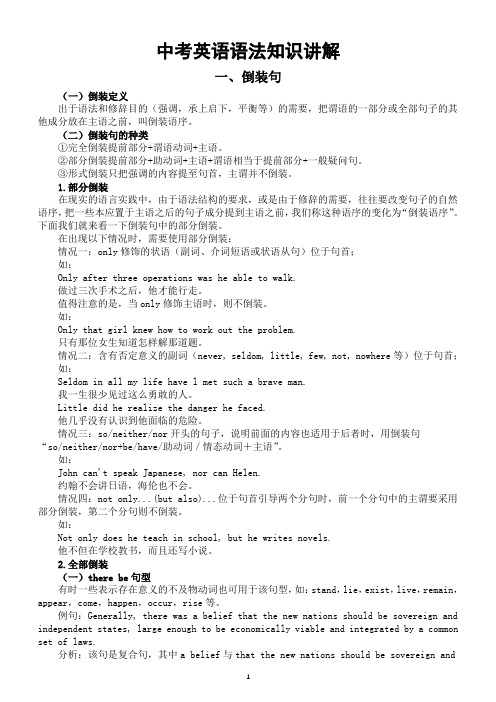
中考英语语法知识讲解一、倒装句(一)倒装定义出于语法和修辞目的(强调,承上启下,平衡等)的需要,把谓语的一部分或全部句子的其他成分放在主语之前,叫倒装语序。
(二)倒装句的种类①完全倒装提前部分+谓语动词+主语。
②部分倒装提前部分+助动词+主语+谓语相当于提前部分+一般疑问句。
③形式倒装只把强调的内容提至句首,主谓并不倒装。
1.部分倒装在现实的语言实践中,由于语法结构的要求,或是由于修辞的需要,往往要改变句子的自然语序,把一些本应置于主语之后的句子成分提到主语之前,我们称这种语序的变化为“倒装语序”。
下面我们就来看一下倒装句中的部分倒装。
在出现以下情况时,需要使用部分倒装:情况一:only修饰的状语(副词、介词短语或状语从句)位于句首;如:Only after three operations was he able to walk.做过三次手术之后,他才能行走。
值得注意的是,当only修饰主语时,则不倒装。
如:Only that girl knew how to work out the problem.只有那位女生知道怎样解那道题。
情况二:含有否定意义的副词(never, seldom, little, few, not, nowhere等)位于句首;如:Seldom in all my life have l met such a brave man.我一生很少见过这么勇敢的人。
Little did he realize the danger he faced.他几乎没有认识到他面临的危险。
情况三:so/neither/nor开头的句子,说明前面的内容也适用于后者时,用倒装句“so/neither/nor+be/have/助动词/情态动词+主语”。
如:John can't speak Japanese, nor can Helen.约翰不会讲日语,海伦也不会。
情况四:not only...(but also)...位于句首引导两个分句时,前一个分句中的主谓要采用部分倒装,第二个分句则不倒装。
深入解读语法倒装句与强调句的区别与联系

深入解读语法倒装句与强调句的区别与联系语法倒装句和强调句是英语语法中常见的两种句型结构。
尽管它们在形式上有一些相似之处,但它们在使用上有着明显的区别。
本文将深入解读语法倒装句和强调句的区别与联系,以帮助读者更好地理解并正确应用这两种句型。
一、语法倒装句1.基本结构语法倒装句是指将动词或助动词放在主语之前,从而改变了正常的句子结构。
语法倒装句主要分为两种类型:-完全倒装: 将整个谓语动词都移到主语之前。
例子:Never have I seen such a beautiful sunset.-部分倒装:将助动词或情态动词放在主语之前,谓语动词保留在其后。
例子:Not only does she play the piano, but she also sings well.2.使用情况语法倒装句通常用以强调句子中的某一成分,或者表示句子的否定或条件。
常见的使用情况包括:-表示地点或方向的副词放在句首。
例子:Out of the blue, a bird flew into the room.-表示否定意义的副词或短语位于句首。
例子:Never have I been so disappointed in my life.-用于条件状语从句中,将谓语动词移到主语之前。
例子:Had I known you were coming, I would have prepared a meal.二、强调句1.基本结构强调句是为了突出句子中的某个成分而对其进行强调。
在强调句中,被强调的成分通常用it来代替,并将这个it放在句子的开头或动词之后,然后通过强调结构将被强调的成分置于句首或句末。
例子:It was John who won the first prize in the competition.2.使用情况强调句常常用于以下情况:-强调主语,强调句子中的人或事物。
例子:It was Jane who broke the vase, not her brother.-强调时间或地点。
英语中的强调句和倒装句
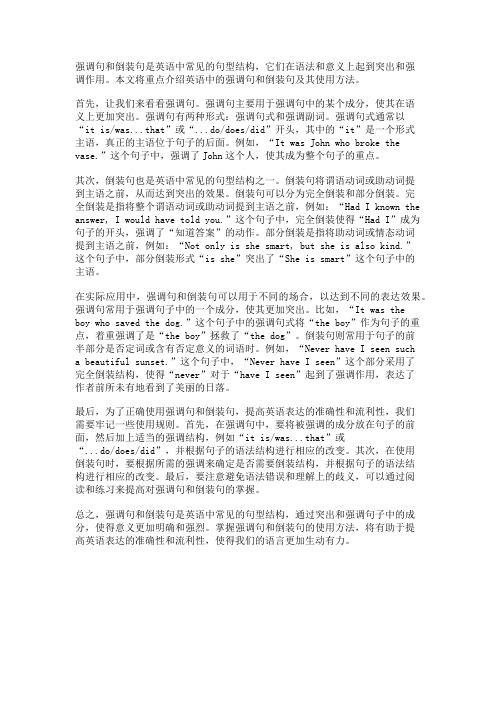
强调句和倒装句是英语中常见的句型结构,它们在语法和意义上起到突出和强调作用。
本文将重点介绍英语中的强调句和倒装句及其使用方法。
首先,让我们来看看强调句。
强调句主要用于强调句中的某个成分,使其在语义上更加突出。
强调句有两种形式:强调句式和强调副词。
强调句式通常以“it is/was...that”或“...do/does/did”开头,其中的“it”是一个形式主语,真正的主语位于句子的后面。
例如,“It was John who broke the vase.”这个句子中,强调了John这个人,使其成为整个句子的重点。
其次,倒装句也是英语中常见的句型结构之一。
倒装句将谓语动词或助动词提到主语之前,从而达到突出的效果。
倒装句可以分为完全倒装和部分倒装。
完全倒装是指将整个谓语动词或助动词提到主语之前,例如:“Had I known the answer, I would have told you.”这个句子中,完全倒装使得“Had I”成为句子的开头,强调了“知道答案”的动作。
部分倒装是指将助动词或情态动词提到主语之前,例如:“Not only is she smart, but she is also kind.”这个句子中,部分倒装形式“is she”突出了“She is smart”这个句子中的主语。
在实际应用中,强调句和倒装句可以用于不同的场合,以达到不同的表达效果。
强调句常用于强调句子中的一个成分,使其更加突出。
比如,“It was theboy who saved the dog.”这个句子中的强调句式将“the boy”作为句子的重点,着重强调了是“the boy”拯救了“the dog”。
倒装句则常用于句子的前半部分是否定词或含有否定意义的词语时。
例如,“Never have I seen sucha beautiful sunset.”这个句子中,“Never have I seen”这个部分采用了完全倒装结构,使得“never”对于“have I seen”起到了强调作用,表达了作者前所未有地看到了美丽的日落。
强调句和倒装句的结构与特点
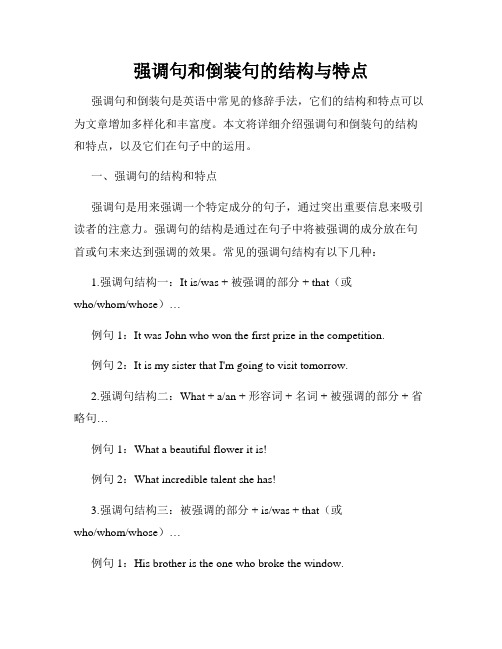
强调句和倒装句的结构与特点强调句和倒装句是英语中常见的修辞手法,它们的结构和特点可以为文章增加多样化和丰富度。
本文将详细介绍强调句和倒装句的结构和特点,以及它们在句子中的运用。
一、强调句的结构和特点强调句是用来强调一个特定成分的句子,通过突出重要信息来吸引读者的注意力。
强调句的结构是通过在句子中将被强调的成分放在句首或句末来达到强调的效果。
常见的强调句结构有以下几种:1.强调句结构一:It is/was + 被强调的部分 + that(或who/whom/whose)…例句1:It was John who won the first prize in the competition.例句2:It is my sister that I'm going to visit tomorrow.2.强调句结构二:What + a/an + 形容词 + 名词 + 被强调的部分 + 省略句…例句1:What a beautiful flower it is!例句2:What incredible talent she has!3.强调句结构三:被强调的部分 + is/was + that(或who/whom/whose)…例句1:His brother is the one who broke the window.例句2:My laptop is what I cannot live without.强调句的特点在于突出强调的部分,使其在句子中显得更加重要和突出。
通过改变句子结构,我们可以将原本普通的句子转变成具有强调效果的句子,从而更好地表达出所要强调的信息。
二、倒装句的结构和特点倒装句是英语中常见的一种语法结构,通常在某些特定情况下使用,以突出句子中的某一成分,给读者更强烈的语感。
常见的倒装句结构有以下几种:1.全倒装:将助动词、情态动词或者be动词放在句子主语之后。
例句1:Not only does she enjoy playing the piano, but she also excelsin it.例句2:Under the bridge runs a clear stream.2.部分倒装:将助动词或情态动词放在主语之前。
句子的倒装与强调

句子的倒装与强调句子的倒装是英语语法中常见的现象,通过改变主语和谓语的位置,可以产生强调的效果。
倒装句在句子结构上与常规语序不同,使得表达更加生动有力。
本文将探讨句子倒装的用法、条件以及强调句的构成和作用。
一、句子的倒装1. 完全倒装完全倒装是指将谓语动词完全放在主语前面。
通常,完全倒装常见于以下情况:a. 状语放在句首例如:On the wall hung a beautiful painting.(墙上挂着一幅漂亮的画。
)b. 地点状语放在句首例如:In front of the classroom stood the teacher.(教室前面站着老师。
)c. 方位副词放在句首例如:Up went the balloon into the sky.(气球升上了天空。
)2. 部分倒装部分倒装是指将助动词或情态动词与主语交换位置,只适用于现在完成时、含有情态动词或be动词的句子。
常见的情况有:a. 含有否定副词not的句子例如:I have never seen such a beautiful sunset before.(在我以前从未见过如此美丽的日落。
)b. 含有否定情态动词的句子例如:She can’t speak French, nor can I.(她不会说法语,我也不会。
)c. so/neither引导的句子例如:She likes ice cream, and so do I.(她喜欢冰淇淋,我也是。
)二、句子的强调句子的强调通过倒装结构来突出某一部分的重要性或突出对比,使得句子更有感染力和表现力。
1. 强调句的构成a. 强调句的基本结构为“It is/was + 被强调的部分 + that/who + 其余部分”。
例如:It was in the library that I found the book I was looking for.(我在图书馆里找到了我一直在寻找的那本书。
高中英语知识点归纳倒装句和强调句的结构和用法

高中英语知识点归纳倒装句和强调句的结构和用法高中英语知识点归纳:倒装句和强调句的结构和用法一、倒装句的结构和用法倒装句是指将动词或助动词提到主语之前的句子结构,主要分为完全倒装和部分倒装两种形式。
1. 完全倒装完全倒装句的结构为“倒装词+谓语+主语”。
主要使用以下几种情况:a. 当句首表地点的介词短语或副词表示地点时:例句:Under the tree stood a little girl.(树下站着一个小女孩。
)b. 当句首表方向的副词或介词短语表示方向时:例句:Out rushed the excited dog.(兴奋的狗冲了出去。
)c. 当表示部分意义的副词或介词短语放在句首时:例句:In front of the house lived an old couple.(房子前住着一对老夫妻。
)2. 部分倒装部分倒装句的结构为“谓语+倒装词+主语”。
主要使用以下几种情况:a. 当句首为否定词或含有否定意义的词语时:例句:Never have I seen such a beautiful sunset.(我从未见过如此美丽的日落。
)b. 当句首为表示条件的状语从句时:例句:Should you need any further assistance, please feel free to contact us.(如果您需要进一步的帮助,请随时与我们联系。
)c. 当句首为表示让步的状语从句时:例句:Hard as he worked, he didn't make much progress.(尽管他努力工作,但进展不大。
)二、强调句的结构和用法强调句是用来强调句子中的某一成分,使其在句子中显得突出和重要。
1. 结构强调句的结构为“It is/was + 被强调部分 + that/who + 句子其余部分”。
2. 用法a. 强调句型通常用在以下情况中:- 强调句子的主语:例句:It was John who won the first prize.(是约翰获得了第一名。
重要知识点总结倒装句与强调句的构成与用法

重要知识点总结倒装句与强调句的构成与用法倒装句与强调句是英语语法中的两个重要知识点,它们的使用能够使句子更加生动有力,突出某些信息。
本文将对倒装句与强调句的构成与用法进行总结,并提供一些实例来帮助理解。
一、倒装句的构成与用法倒装句是指将句子中的主语和谓语动词的位置颠倒,或将助动词或情态动词与其后的主语颠倒。
倒装句在强调句子的某些内容,或者在特定语境下,可以使句子更加简洁、清晰明了。
1. 完全倒装完全倒装是指将句子中的主语和谓语动词的位置颠倒,通常出现在以下情况下:a) 当以表示地点、方向或方式的副词、介词短语或状语从句开头时,常使用完全倒装。
例如:- Away went the cat, chasing after the mouse.(猫跑了,追赶着老鼠。
)- In came the teacher, bringing a pile of books.(老师进来了,带着一堆书。
)- Under no circumstances should you give up.(在任何情况下都不应该放弃。
)b) 当以表示否定意义的词语开头时,常使用完全倒装。
例如:- Not only did he finish the project ahead of time, but also he did an excellent job.(他不仅提前完成了项目,而且做得非常出色。
)- Never have I seen such a beautiful sunset before.(我从未见过如此美丽的日落。
)- Seldom does she complain about her workload.(她很少抱怨自己的工作量。
)c) 当以表示条件的状语从句开头时,常使用完全倒装。
例如:- Should you need any further assistance, please do not hesitate to contact us.(如果你需要任何进一步的帮助,请随时与我们联系。
语法中的强调句与倒装句
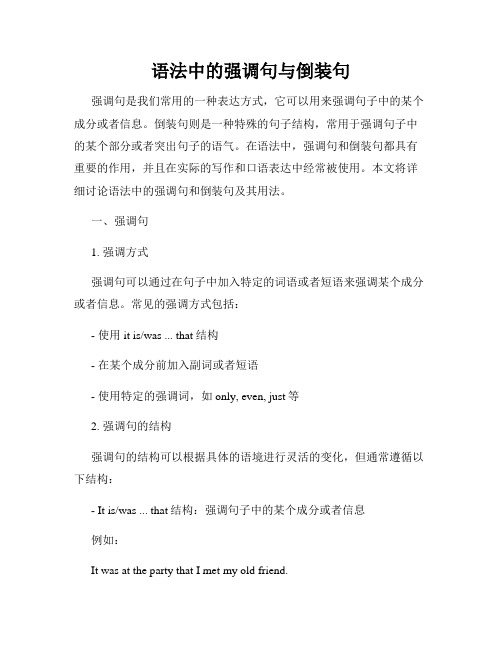
语法中的强调句与倒装句强调句是我们常用的一种表达方式,它可以用来强调句子中的某个成分或者信息。
倒装句则是一种特殊的句子结构,常用于强调句子中的某个部分或者突出句子的语气。
在语法中,强调句和倒装句都具有重要的作用,并且在实际的写作和口语表达中经常被使用。
本文将详细讨论语法中的强调句和倒装句及其用法。
一、强调句1. 强调方式强调句可以通过在句子中加入特定的词语或者短语来强调某个成分或者信息。
常见的强调方式包括:- 使用it is/was ... that结构- 在某个成分前加入副词或者短语- 使用特定的强调词,如only, even, just等2. 强调句的结构强调句的结构可以根据具体的语境进行灵活的变化,但通常遵循以下结构:- It is/was ... that结构:强调句子中的某个成分或者信息例如:It was at the party that I met my old friend.正是在派对上,我遇到了我的老朋友。
- 在某个成分前加入副词或者短语例如:I found the book on the table.是我在桌子上找到了那本书。
- 使用特定的强调词例如:Only you can solve this problem.只有你可以解决这个问题。
3. 强调句的注意事项在使用强调句时,需要注意以下几点:- 强调的成分通常放在句首或者句末,以突出其重要性。
- 强调句的语序和一般句子不同,需要注意语法结构的调整。
- 强调句的使用应适度,过多的强调可能会导致语言过于夸张或者武断。
二、倒装句1. 倒装句的分类倒装句是指将句子的主语和谓语动词的位置进行互换的一种语法结构。
根据倒装的具体方式,可以将倒装句分为以下几种类型:- 完全倒装:将句子的全部动词进行倒装。
- 部分倒装:将助动词或情态动词与主语进行倒装。
- 省略倒装:省略句子中的某些成分以实现倒装。
2. 倒装句的用法倒装句常常用于以下几种情况:- 在以never, not, nor, only等否定词开头的句子中,将谓语动词与主语倒装。
- 1、下载文档前请自行甄别文档内容的完整性,平台不提供额外的编辑、内容补充、找答案等附加服务。
- 2、"仅部分预览"的文档,不可在线预览部分如存在完整性等问题,可反馈申请退款(可完整预览的文档不适用该条件!)。
- 3、如文档侵犯您的权益,请联系客服反馈,我们会尽快为您处理(人工客服工作时间:9:00-18:30)。
倒装句和强调句型一.倒装句倒装句:部分倒装(主语和be, 情态动词,助动词倒置)和完全倒装(主语和谓语完全倒置)I. 完全倒装:1. 用于there be句型。
2. 用于here ( there, now, then)+不及物动词+主语句型,或以out, in, up, down, away等副词开头的句子里,以表示强调。
注意:代词作主语时,不用倒装。
3 . 当句首状语为表示地点的介词词组时。
4. 表语置于句首时,“表语+系动词+主语”5. 用于so, nor, neither开头的句子,表示重复前面的部分内容。
(例子如下)6. 为了保持句子平衡,或为了强调表语或状语,或使上下文紧密衔接时。
1. There are many students in the classroom.2.Then came Marry and George. In the castle lived the Snow White with the seven dwarfs. .Here comes the bell. Now comes your turn. Out went the children.3. South of the city lies a big steel factory. From the valley came a frightening sound.4.Present at the meeting were Professor White, Professor Smith and many other guests.Gone are the days when they could do what they liked to the Chinese people.5.He has been to Beijing. So have I . Li Wei can’t answer the question. Neither can I.6.They arrived at a farmhouse, in front of which sat a small boy.II. 部分倒装1. 用于“表语/状语/动词原形+ as 引导的让步状语从句时,若表语为名词,其名词前不加任何冠词。
Child as he was, he had to make a living.Hero as he is, he still has short comings. Much as I like it, I’ll not buy it.Pretty as she is, she is not clever. Try as he would, he might fail again.2..省略了if的虚拟条件句中,were, had或should提到句首.Were I not so busy, I should go with you.Had he been here yesterday, he would have come to watch the football match.3.在so…that(如此…以至于)句型中,若so…提到句首。
So carelessly did he drive that he almost killed himself.So loudly did he speak that people in the next room could hear him.4 .用于no sooner…than…“一…就…”, hardly…when…“刚一…就…” ,not only…but also和not until句型中.Hardly had he began to speak when his father stopped him.Not until the teacher came did he finish his homework..Hardly had we got home when it began to rain. (=We had hardly got home when it began to rain.)No sooner had I left home than it began to rain.(只用于过去的情况。
No sooner引起的从句中,谓语动词用过去完成时)5.用于never, hardly, seldom,. Scarcely(简直不、几乎不), barely(几乎没有), little, often, , not only, not once(一次也不)等否定副词开头的句子。
Never shall I do this again. Little did he know who the woman was.Seldom in my life have I met so determined a person.6.在含有no的词组出现在句首时如at no time(决不、从来没有), in no time(立刻、很快) , in no way等。
In no way can they leave freely.(他们决不能随便离开)Nowhere could they find the lost child.7.用于only+ 状语开头的句子Only this afternoon did I finish the novel. Only in this way can you master English.8.neither/not…nor引导两个分句时,这两个分句中的主谓均要倒装。
Neither do I know her address, nor does he. Not could the patient eat, nor could he drink.二.强调句型1. 陈述句的强调句型It is/ was + 被强调部分(通常是主语、宾语或状语)+ that/ who(当强调主语且主语指人)+ 其他部分。
2. 一般疑问句的强调句型同上,只是把is/ was提到it前面。
Eg. Was it yesterday that he met Li Ping?3. 特殊疑问句的强调句型Wh- + is/ was + it + that/ who + 其他部分?强调名词从句:wh-(引导词) + it was/is +that + …Eg. When and where was it that you were born?4.not … until … 句型的强调句A. 句型为:It is/ was not until + 被强调部分+ that + 其他部分普通句:He didn't go to bed until/ till his wife came back.强调句:It was not until his wife came back that he went to bed.B. 注意:此句型只用until,不用till。
但如果不是强调句型,till, until可通用;因为句型中It is/ was not ... 已经是否定句了,that后面的从句要用肯定句,切勿再用否定句了。
5.谓语动词的强调如果需要强调谓语时,用助动词do/ does或did ,过去时用did,后面的谓语动词用原形。
Eg. Some people do believe that nuclear power poses a threat to the world peace.1. I really don’t know ________ I had my money stolen.A. when was it thatB. that it was whenC. where it was thatD. it was where that 2.. Mr Mike doesn’t understand ________made his wife so upset this morning.A. what was itB. why it was thatC. how that wasD. what it was that3. Was ________that I saw last night at the concert?A. it youB. not youC. youD. that yourself4. I couldn’t know ________that prevented so many students from coming to school on time thismorning.A. what it wasB. what was itC. why it wasD. why was it5. When asked to explain ________it is that he does to make his students so enthusiastic about school,he pauses and thinks deeply, “I think it comes down to respect.”A. whatB. whyC. howD. when6. It was in the café ________the girl met me ________she told me her love story.A. that; thatB. where; thatC. when; thatD. where; when8. Is it the Yellow Stone Park ________some of my friends visited last week ________has been taken charge of by the local government?A. where; whichB. that; thatC. that; whichD. which; whichKeys: 2. C 3. D 4. A 5. A 6. A 7. B 8. B。
